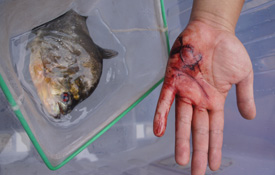|
 |
 |
|
TERROR FROM FAR AWAY: Zhang Kaibo shows the wound on his hand and the piranha which attacked him in Liujiang River near Liuzhou, Guangxi Zhuang Autonomous Region, on July 7 (XINHUA) |
A GREEN DISASTER: Overgrown water hyacinth, an invasive plant introduced in China as pig feed, floats down the Minjiang River in southeastern Fujian Province and clogs up the intake gates of a hydropower plant at the lower reaches (LIN SHANCHUAN) |
Authorities in Liuzhou, southwest China's Guangxi Zhuang Autonomous Region, launched a raid for a cold-blooded menace currently at large in a local river early last month. The target of their hunt was not a serial killer, but the Amazon piranha. The carnivorous fish was responsible for attacks on two residents and considered to be still present near the city.
On July 7, Zhang Kaibo was attacked by at least three red-belly piranhas while giving his pet dog a bath in local Liujiang River. Part of Zhang's palm was bitten off by the fish.
"I felt the pain and tried to get rid of the fish, but one clung on my palm until I hit it off on a rock," Zhang said at his home. The fish, chopped into pieces but with its jaw wide open, was on a table in the kitchen.
Zhang's friend Wu Rihua, the other victim, was bitten on the thumb as he played with the fish in a net by the riverside.
Zhang said that he and his friend killed just one of the three fish that attacked them while the other two swam away.
The fish was later confirmed by experts as a piranha native to South America. Pictures of the fish and Zhang's injured palm caused an immediate stir online and prompted the local government to take emergency countermeasures. To mobilize local residents to go fishing for the dangerous fish, the city's fishery authorities offer 1,000 yuan ($157) as a reward for every confirmed piranha kill.
Liuzhou's game fishing association has also urged its members to join the fish hunt in order to "annihilate the man-eating fish in the shortest possible time."
Fishery authorities hired five fishing boats and 10 experienced fishermen to catch piranha, but no fish were found during a five-day hunt that concluded on July 13.
"This means the number of piranha is likely rather small," said Liu Haijun, deputy head of Liuzhou's fishery supervision agency. "It is like looking for a needle in a haystack."
Investigators said that piranhas were probably released into the river by residents who bought them as ornamental fish. Guangxi's tropical climate is similar to the piranha's natural habitat.
"Piranha can reproduce very fast in environments similar to Amazon River. In addition, the piranhas have no natural enemies here to keep their numbers in check," said Chen Qingchao, a senior researcher at the South China Sea Institute of Oceanology in Guangzhou, southern Guangdong Province. He warned of the possibility of a large number of native fish falling prey to the alien species.
The piranha is among the most dangerous species in the Amazon region and they often attack people and animals, said Zhou Jie, an expert at the Guangxi Regional Fisheries Research Institute.
As early as 2002, after finding the invasion of the carnivorous fish and worrying about the threat to indigenous fish, China's fishery authorities launched a campaign to rid the country of all captive piranhas, even those kept by aquariums.
However, even amid public fears of piranha attacks, some pet stores in Liuzhou are still "secretly" selling piranhas to buyers who are willing to wait for a short period of time, according to Xinhua News Agency.
Some experts said that there is no need for the public to panic over the chances of being bitten by piranha as the imported predator is unlikely to thrive locally. "As piranha can only live in warm waters, the relatively harsh winter in Liuzhou makes it almost impossible to maintain a population here," said Wei Yongwen, head of the city's Fishery and Animal Husbandry Bureau.
A country besieged
The piranha is not the only alien species that has appeared in China. Although it remains unnecessary for swimmers in Liuzhou to worry about piranha attacks, other alien species have long plagued economies and ecosystems.
According to China's Fourth National Report on the Implementation of the Convention on Biological Diversity released in 2008, more than half of the 100 of invasive alien species listed by the International Union for the Conservation of Nature had entered China and more than 400 invasive alien species had been recorded in the country, causing annual economic losses totaling around 120 billion yuan ($19 billion).
Usually, these species are introduced to new ecosystems inadvertently, although many are purposefully introduced for food cultivation or for attempts at ecological intervention.
| 